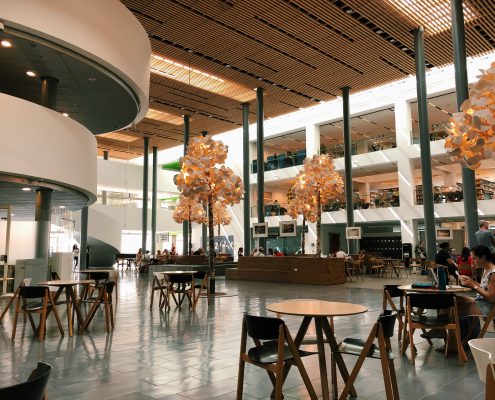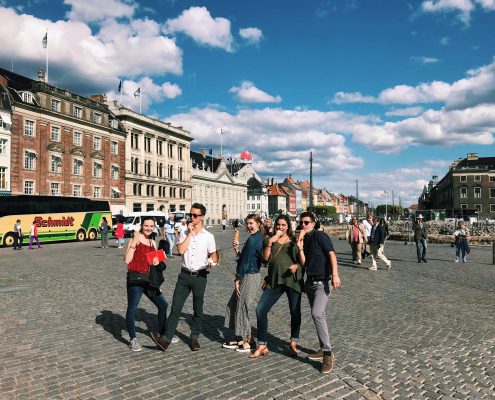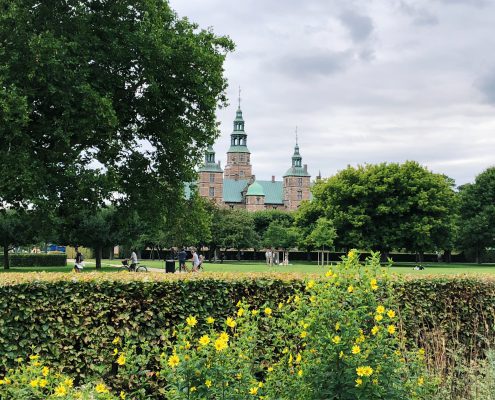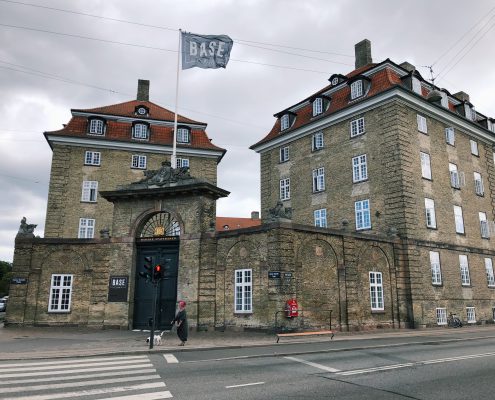By Chloe Zgorzelski
Denmark: a cycler and pastry-lover’s paradise. Often lovingly labeled the “Venice of the North”, Copenhagen is a city known for its charming canals and waterways, pastel Lego-like buildings, delicious (albeit sometimes hard to pronounce) pastries, and love of hygge [pronounced ‘hoo-gah’: simply put, the Danish art of cozy, comfortable, and content living]. These are just a few of the many reasons why I chose to study abroad in this captivating city. After living here for a little over a month, it is no surprise to me that the Danes are consistently ranked among the happiest people in the world. I have already experienced, been challenged, and grown in so many ways during my time here, so I figured I would share five things I have learned that will help future UCEAP students make the most of their study-abroad adventure in Copenhagen.
- The UCEAP – University of Copenhagen Program is Unique: When compared to other UCEAP programs, a semester abroad at the University of Copenhagen is special because all students are required to participate in a three-week intensive Danish language program during the month of August. As a student who has never spoken or heard an ounce of Danish before my arrival in Copenhagen, this class was challenging for me at times, especially since it is so fast paced. However, the class size is small (approx. 25 exchange students from all over the world in each section) which means the professors have the ability to give you the individualized attention you need to help you succeed. You are also able to take the class Pass/No Pass if you wish.
- You Don’t Have Know How To Speak Danish to Study Abroad in Denmark: Studying abroad in a foreign country can be difficult, especially when you chose a country where a language other than English (or your native language) is spoken. Prior to my arrival in Denmark, one of my fears was that I wouldn’t be able to communicate well with anyone due to my lack of Danish knowledge. However, most Danes speak English! UCPH’s Intensive Danish Language Program will help teach you many basic Danish phrases that you can use in day to day life, but if worse comes to worse, all you have to do is start speaking in English and the Danish people will flawlessly switch over to English to communicate with you.
- Eating Out in Denmark Can Be Expensive: Unfortunately, Copenhagen is not one of those cities where it is feasible to buy a coffee and a pastry from a cafe every day on a student budget (A coffee, on average, costs around $7 USD). Eating Out at Restaurants can also start to add up after a while. However, it is significantly cheaper to shop at grocery stores (Netto, Aldi, and Fatka are my personal favorites) and cook your meals at home. If you visit some grocery stores before closing, many will sell their leftover pastries to you at half price! My friends and I organize group dinners, where we go shopping and cook a meal together. This way we can split the cost and still spend time with one another. Many of the dorms in Copenhagen organize group dinners as well.
- You Don’t Have to Buy Furniture + Kitchen Supplies for your Dorm: If you book your accommodation through the UCPH Housing Foundation (as most UCEAP students do), then your cozy, new Danish Dorm is already outfitted with basic furnishings (desk, bed + mattress, closet, kitchen table etc.) and kitchen utensils (pots, pans, dishes, utensils etc). However, you will be responsible for buying your own pillows, towels, sheets. These items are easy to find and relatively inexpensive at stores like Fotex, Jysk, and Ikea.
- There is No Uber in Denmark: As of Spring 2017, Uber no longer legally operates in Denmark. But have no fear! Denmark and the Copenhagen area in particular has a very reliable and user-friendly public transportation system. There are only two metro lines and they run 24/7. Copenhagen is also notorious for being a very bike-friendly city. Most Danes (and many UCEAP students) choose to bike as it is a reliable and relatively inexpensive form of transport here in Denmark.
A Few Helpful Apps….
- Rejseplanen: extremely helpful when trying to figure out how to navigate Denmark’s bus, metro, and S-train system. After downloading and enabling location services, the app will recognize your current location. All you have to do is type in your destination and the app will provide a you with a list of the fastest ways to reach it.
- Google Translate: for when you want to read a sign, or need help reading the packaging in the grocery store
- UCPH Map: provides you with an interactive map of all four University of Copenhagen campuses, which is extremely helpful especially during the first weeks of school
- DOT Mobilbilletter: allows you to buy transport tickets for the bus, train, and metro from your phone, which is great when you are running late or in a pinch
- TooGoodToGo: in an effort to reduce food waste, local restaurants/bakeries/grocery stores sell their leftover food at a discounted rate. All you have to do is pay through the app, and it will give you a time that you can head to the chosen location to pick up your meal!







